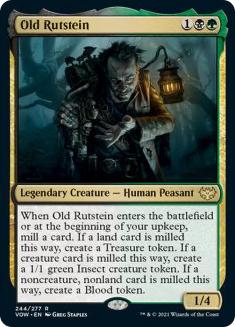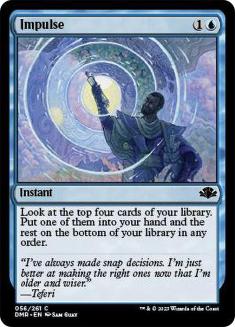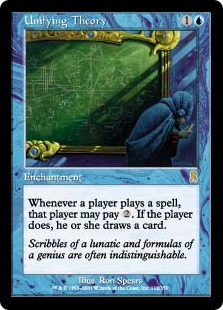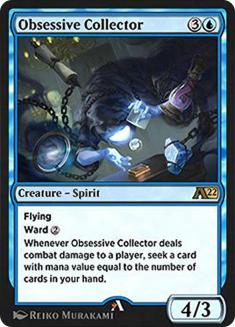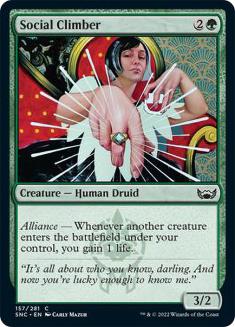Today is my last official day at Star City Games. I’m in Hawaii, in literal paradise, and while my friends and fiancée are hiking to a picturesque waterfall, I’m pretending to write this article and drafting Alchemy: Baldur’s Gate.
Don’t worry: they don’t read my stuff, and my deck is looking pretty decent through Pack 2.
Magic: The Gathering has an undeniable gravity. Since we cracked the code on actual gravity over 300 years ago, I wanted to take a shot at analyzing the game I love. Why do I want to build a Commander deck when I have two decks I’ve barely played? Why does this person make decks that self-destruct? How do you build 161 decks to only play once a month?
What is wrong with us?
Like Abraham Maslow or Ron Swanson, I felt it best to tackle the question with a pyramid. I’d like to introduce you to the Magic: The Gathering Brewing Investment Pyramid. I promise that this deals with strictly emotional investment, as financial pyramids have only led me to buy knives I didn’t need.
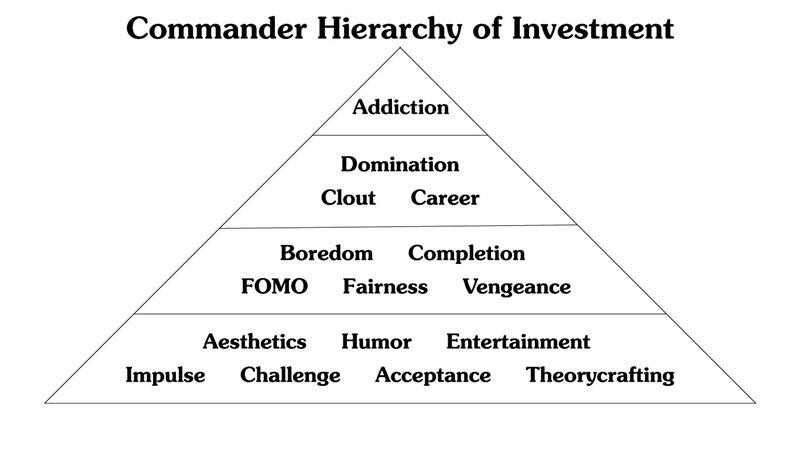
Low Investment
Aesthetics: you enjoy the camp of the game.
I’m guilty of forgetting that these cards contain actual works of art on them until I started brewing an Old Gregg deck with Old Rutstein and only art from people named Greg. Do D. Alexander Gregory and Nicholas Gregory count? These are the primary questions an aesthetic will concern themselves with. Is the deck any good? If it shows up looking sharp, the answer is a resounding “yes.” While a fully “blinged-out” deck belongs a tier up, having a few foils never hurt.
Entertainment: you enjoy the game, period.
You look forward to your weekly meetup like it was your dad’s poker game with his buddies. Shuffling up and drawing seven of anything brings you a deep joy that you’ve recognized since you first played. If this pyramid had a single base layer, this would be it. Questioning this fundamental portion of your Magic experience is a sign you should step away from the game.
Humor: you love a good meme.
While it’s not advisable, you only play 31 lands because your deck is “nice.” You’re here for a good time, not a long time, and your deck reflects your sensibilities. We play a silly game where Goblins can kill giant floating warships, and you revel in that by building for flavor first. The social part of the game is where you thrive, a tree in a forest that makes a fart noise when it falls, even if no one else is around.
Challenge: you love a good stipulation.
Why did I build a mono-red group hug deck? Mostly because it didn’t exist. It probably shouldn’t. Players who love the challenge embrace the full scope of Magic’s tens of thousands of cards to defy convention. Your favorite word is “can’t,” and you tend to approach brewing like an improv show, where you can take a suggestion from the crowd and make proverbial magic out of it.
Acceptance: you want to fit in with your playgroup.
Maybe your deck isn’t the most powerful, but people love playing with you because you’ve built to meet your friends where they’re at. You’re conscientious about the unwritten rules of your playgroup, whether it’s your buddy who insists that tutors aren’t fun or that same buddy who thinks that fetchlands take too much time while everyone waits for you to shuffle up. Cory, I’m looking at you, bud. Embracing the “gathering” is what you play for.
Impulse: you see things and want to build them.
Ooh, a shiny new thing! It certainly feels like we get a lot of them lately, and you’re compelled by whatever Wizards of the Coast (WotC) throws at you. You scrap decks on a whim to try something new, and you don’t let sentimentality bog you down. If they didn’t want us to make more decks, they’d stop printing cards.
Theorycrafting: you build for the sake of building.
Decks exist not to be played, but to be invented. This is the closest thing that exists to the next tier, as you spend a lot of time thinking about Magic rather than playing it. The tangible cardboard is almost irrelevant, representing concepts more than game pieces. You’re fascinated by new mechanics when they’re introduced, seeing the math floating around you.
Medium Investment
Boredom: you’re tired of playing the same old decks.
My tenth-grade science teacher Mr. Robinson would always say, “If you’re bored, you’re boring,” and you hate him for that. Brewing is an escape from the monotony of your standing game, watching things play out as everyone expects. You don’t have anything against your decks, other than they function too well to give you any pleasure. There’s a pile of them gathering dust in your office, and they have conversations about you behind your back like it was Toy Story.
Completion: you have to build them all.
You’re the embodiment of Pokémon, needing to make every color combination to take full advantage of the sweet lands you poured a fortune into. You enjoy the collecting part of Magic, and the next deck you make is an excuse to fill up your cart with the singles you crave. There’s a box you promised you were going to hold on to in your closet that you’re going to crack after reading this to see what new toys you have to play with.
FOMO: you want what everyone else has.
I’m guilty of being Very Online, seeing what the deck du jour is, and then immediately wanting to buy it. At this point, you think being a netdecker isn’t an insult but a badge of honor, saving you needless time experimenting with the right combination of pieces. The idea of playing an outdated deck is cringe and must be avoided at all costs. Also, you’re checking EDHREC to see what people are adding to your list each time a new set drops.
Fairness: you want a deck to play with any group.
From budget decks to precons to a Tier 1 cEDH deck, you’re building a bit of everything. You long ago outgrew a Quiver and instead have a toolbox that houses your army, ready to walk into any LGS and talk a little Rule 0. You’re different from a completionist, as you don’t need every deck, just every power level.
Vengeance: you have someone you want to destroy.
That jerk who comes to Friday Night Magic with a Turn 3 infinite combo while everyone else is having fun drawing their tokens? Well, this time it’s personal. You’re the defender of the defenseless, or you just really dislike the way someone chews in your regular game. It’s probably healthier to just have a discussion about eating at the table, but you do you.
Highly Invested
Domination: you love a good pubstomping.
Magic is only about winning, and anything short of that is a failure for you. Every turn is about making optimal plays, and chip damage is downright delicious. Why have a Rule 0 conversation when everyone is doomed to begin with, right? This feels like it has the highest highs and the lowest lows, but winning cures everything.
Clout: your life is Commander.
Magic is less about the game and more about Commander Twitter, getting invitations to be a guest on the most-viewed streams, and booking your next CommandFest ticket. You create content full-time, have a Patreon, and people value your opinion when a new set comes out. It’s something I really thought I wanted until I saw how hard these people work behind the scenes.
Career: you make a living selling Commander and Commander accessories.
You have to find innovative storage solutions for your collection because it’s an entire wing of a house. Brewing decks is about pure math: how much can I sell this deck for? What cards do I think will crash in value that I can dump a week early? It’s all finance, all the time, and you survive on your cunning and understanding of the Magic economy.
Overinvested
Addiction: you have a problem.
There’s no joy left, only compulsion. Your spending is out of control, your personal relationships are suffering, or you’re lying about how frequently you’re playing. The thought of taking a break makes you sweat a little on the back of your knees. I was almost here a few months ago, and I have to remain vigilant to make sure I don’t wade into this territory.
What I know is that it’s very easy to move up the pyramid, depending on the route you want to take. A lot of people who wound up trying to make a career out of Commander started off as impulsive players who became completionists. People who yearned for acceptance develop FOMO and need clout to get the validation they seek. Those who want to dominate probably sought some vengeance at one point and were turned.
Moving down the pyramid from addiction? That’s rough.
What I encourage you to do is think about the external forces that have led you to your place in the pyramid. Having a strong locus of control is important to ensure what you’re doing is still fun and controllable. When you work from the outside in, you’re at the whim of others, and the Internet isn’t known for being the kindest place.


